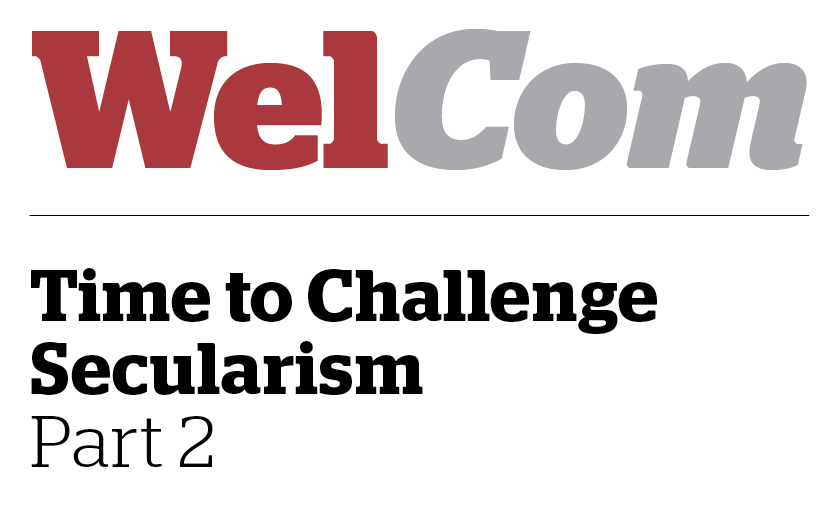May 2016
Feature
Is it enough to drift along with prevailing views, whether secular or religious? Do we need to sharpen our responses to them both? Emeritus Bishop Peter Cullinane DD explores these questions in the second and final part of his article.
In his letter to the Romans, the apostle Paul was scathing in his description of how depraved people became through ignoring God. It seems some things haven’t changed. According to a report in the Sunday Star Times (Nov 24 2013), the Department of Internal Affairs had blocked 34 million attempts within New Zealand, over three years, to access child sex-abuse sites; New Zealanders seeking child pornography were increasingly demanding younger children and more violent abuse; and globally abuse is becoming more and more degrading.
Society doesn’t seem to notice its own contradictions, or even make connections: for example we condemn sexual abuse, but treat pornography as a bit of a giggle; we deplore domestic violence, but serve up violence on the media as a form of entertainment. We ignore the dynamics of addiction, and those who are not practised in self-restraint eventually go to any lengths to get what they want. We have become the kind of society in which it is easier to commit abuse without feeling shame, and to boast about it on social media. Victims are perceived as objects, not as persons made ‘in the image of God’.
The apostles’ description of dulled minds and folly still fits. Some even do an extra contortion: they ‘prove’ the non-existence of God by excluding from their enquiry anything that cannot be known by the methods of scientific observation! Never mind that some of the conditions necessary for doing science, and doing it responsibly, lie outside the scope of what can be scientifically proved, for example personhood, personal integrity, commitment to truth, human freedom, values, ideas, compassion, love…
There are others who have a vested interest in keeping God out, for example, unscrupulous employers. The Department of Labour has recently uncovered widespread exploitation of vulnerable workers – migrants and young people – and fraud by employers. Suppressing conscience goes with suppressing God.
Yet others subscribe to an economic theory that the sole function of business is to maximise profits, it being someone else’s responsibility to take care of the social consequences. And so, jobs can be eliminated and livelihoods threatened for no other reason, ultimately, than to increase profits, even if they are already huge. Workers are seen mainly as cost items, and targets for cost-cutting; disposable. Variations of this practice are even considered normal, acceptable, and simply good business – even by some who profess religious faith. But they contradict their faith, because persons made ‘in the likeness of God’ may not to be treated as we would treat goods and chattels.
This serves to exemplify where faith’s emphasis on the dignity of every person, and the State’s responsibility for the common good, converge. If it has been misguided on the part of any faith to try to co-opt the State to its own confessional interests, it is now equally misguided on the part of the State to make secularism’s confessional interests its own. The practical exclusion of God from the public domain is reductionist secularism’s specific agenda. It is not a non-partisan stance. The State’s responsibility to promote the common good can involve facilitating the beneficial effects of any cultural vision, of which secularism is only one. The State is properly secular without adopting reductionist secularism’s indifference to religion, disguised as neutrality.
If secularism has much to answer for, so too do the spiritual descendants of Abraham, who at least know better, but whose ability to influence society is hampered by religion’s ambiguous reputation. In varying degrees we all contribute to this situation by our unfaithfulness. In fact, there is a case for secularism to challenge believers. Religion is degraded when God is diminished, for example: by pious practices that suggest people need to earn God’s favour, or that would supposedly put God in our debt; or by teachings that put limits on God’s presence, love or mercy; or by practices that associate God more with social, political or economic elites; or by those who think their relationship with God can be separated from their relationships with the world around them, or that ‘going to church’ is the main measure of people’s faith or faithfulness. In these ways, religion, too, becomes reductionist. Sooner or later people seeking God, even if only implicitly by seeking truth, find that reductionist ‘religion’ – like reductionist secularism – fails to satisfy. This is even before they experience misrepresentations of God by fundamentalism, literalism, fanaticism, or crusades and wars carried out in the name of religion, whether Christian, Jewish or Muslim.
The rejection of diminished religion can reflect the quest for truth that is sometimes implicit within agnosticism’s doubts and secularism’s indifference. Diminished faith does not always connect with important human aspirations. This justified the Second Vatican Council’s claim that: ‘Christians can have more than a little to do with the birth of atheism’ (Church in the Modern World, n.19).
It is the fullness of faith that both challenges and attracts. What attracted Moses and the prophets completely transcended their understanding, but could not be ignored. It was an experience of God intimately involved in their lives and struggles, but not at their beck and call, and not answerable to them: ‘I am with you as who I am’ (Exodus 3:1-15). Ultimately, this was the mystery of God’s un-owed, self-giving love for all creation. By surrendering to that love, we become participants in God’s love for the world.
This is the transformative experience that makes us more fully ourselves, more fully human, and more fully alive. And it is a worthy alternative for those who discover that secularism is an incomplete way of life.
